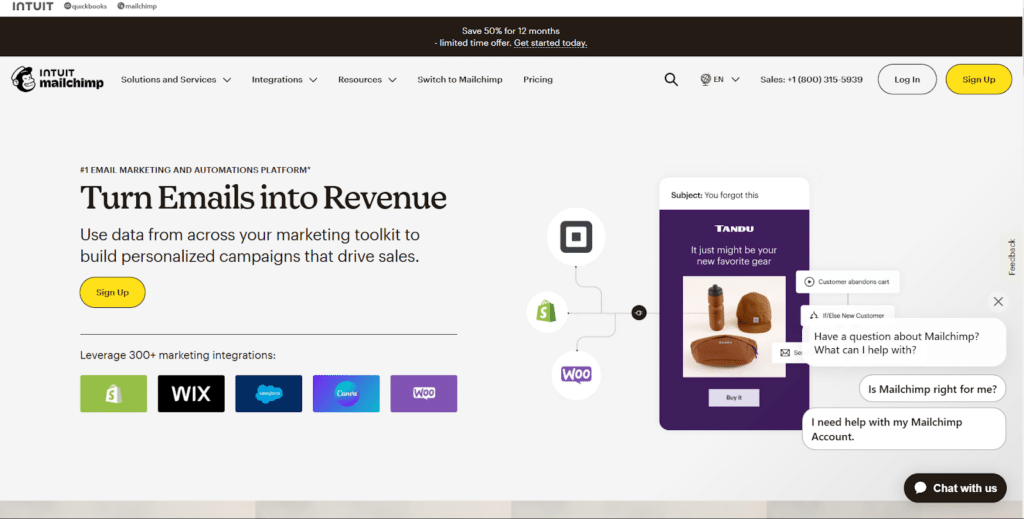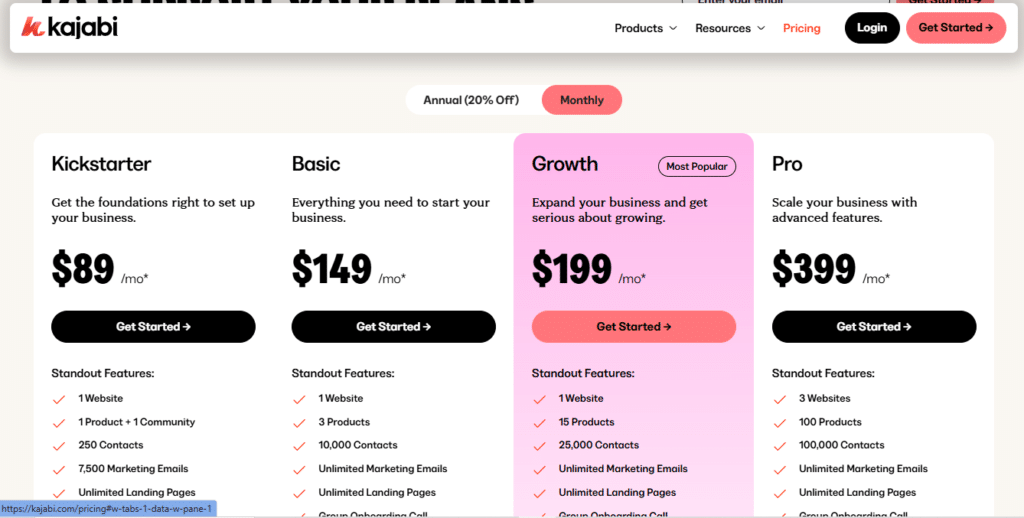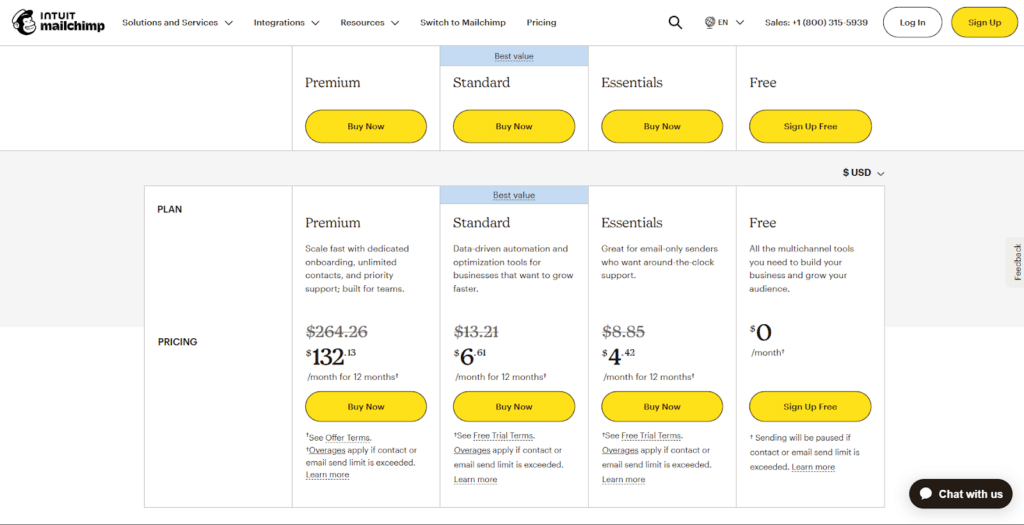Kajabi vs Mailchimp: A Comprehensive Platform Comparison
When building an online business that combines course creation with effective email marketing, choosing the right tools is crucial for growth and operational efficiency. Kajabi and Mailchimp represent two fundamentally different solutions that address distinct aspects of the online business ecosystem. While Kajabi offers an all-in-one platform including course creation and basic marketing, Mailchimp provides specialized email marketing with advanced capabilities. This detailed comparison will help you determine whether one platform can meet all your needs or if a combined approach would be more effective, depending on your specific business requirements.
Overview of Kajabi

Kajabi is an all-in-one platform designed for entrepreneurs, creators, and educators looking to build and scale their online businesses. It provides a comprehensive ecosystem for creating, marketing, and selling digital products such as online courses, memberships, and coaching programs—all without relying on multiple third-party tools.
With its integrated website builder, email marketing automation, and sales pipeline creation, Kajabi simplifies the process of running a digital business. Even users with minimal technical knowledge can easily create high-quality content using pre-built templates and intuitive drag-and-drop functionality. By integrating powerful marketing tools with a robust learning management system (LMS), Kajabi enables businesses to efficiently attract, engage, and convert their audience while maximizing revenue—all from a single, user-friendly dashboard.
Key Features of Kajabi
- Course Creation Tools: Develop and deliver engaging online courses with video content, assessments, and drip-fed lessons.
- Website Builder: Design fully responsive, professional websites with built-in blogging capabilities and customizable templates.
- Sales Pipelines: Create automated funnels for lead generation, product launches, and webinars.
- Email Marketing Automation: Send personalized email campaigns, track engagement, and automate follow-ups.
- Membership Capabilities: Set up subscription-based memberships to generate recurring revenue.
- Payment Integration: Securely accept payments via Stripe and PayPal with zero additional transaction fees.
- Analytics Dashboard: Monitor revenue, track customer behavior, and measure marketing performance with in-depth insights.
- Community Features: Build an interactive member space for discussions, engagement, and networking.
Ideal User Base for Kajabi
- Course Creators: Educators and professionals looking to monetize their knowledge through online courses.
- Coaches & Consultants: Those offering coaching services, webinars, and one-on-one mentorship programs.
- Membership Site Owners: Entrepreneurs looking to create thriving subscription-based communities.
- Digital Entrepreneurs: Individuals managing multiple digital products and looking for a streamlined business solution.
Overview of Mailchimp

Mailchimp is a leading marketing platform that has evolved from its origins as an email service provider into a comprehensive marketing automation solution. Founded in 2001, Mailchimp has grown to become one of the world's most widely used marketing platforms, serving millions of businesses from solopreneurs to established enterprises.
Unlike all-in-one business platforms that focus on specific business models like course creation, Mailchimp specializes in marketing communication across multiple channels with an emphasis on email marketing, audience management, and campaign orchestration. The platform excels at helping businesses build relationships with their audiences through targeted, data-driven marketing that drives engagement and conversions.
What distinguishes Mailchimp is its depth of functionality in audience management and email marketing, combined with an intuitive interface that makes sophisticated marketing accessible to users without specialized expertise. While it doesn't offer native course creation or membership site features, Mailchimp provides enterprise-grade marketing capabilities that integrate with virtually any business model—making it a powerful complement to specialized content platforms for businesses seeking best-in-class functionality in each area.
Key Features of Mailchimp
- Email Marketing: Create and send professional email campaigns with an intuitive drag-and-drop editor.
- Marketing Automation: Build targeted customer journeys with behavior-based triggers and personalization.
- Audience Management: Organize contacts with tags, segments, and custom fields for targeted messaging.
- Landing Pages & Forms: Create conversion-focused pages and signup forms without coding knowledge.
- Customer Journey Builder: Design multi-step marketing sequences across channels with visual workflows.
- A/B Testing: Optimize campaign performance with split testing for subject lines, content, and send times.
- Analytics & Reporting: Track campaign effectiveness with detailed metrics and performance insights.
- Multichannel Marketing: Coordinate messaging across email, social media, postcards, and digital ads.
Ideal User Base for Mailchimp
- Small to Medium Businesses: Companies seeking sophisticated marketing without enterprise complexity.
- E-commerce Retailers: Online stores looking to increase sales through targeted marketing campaigns.
- Content Creators: Bloggers, podcasters, and media companies building audience relationships.
- Service Providers: Professionals maintaining client connections through regular communication.
- Nonprofit Organizations: Charities and associations engaging supporters and managing donor relations.
Core Functionalities Comparison
Understanding the fundamental differences between Kajabi and Mailchimp is essential for determining whether one platform can meet all your needs or if a combined approach would be more effective. This section provides a detailed analysis of their capabilities in key functional areas.
1. Email Marketing Capabilities
Kajabi includes built-in email marketing as part of its all-in-one solution. The platform offers email campaigns, automated sequences, and visual automation builders for creating marketing workflows. Kajabi's email editor provides customizable templates with drag-and-drop functionality, allowing users to create professional-looking emails without design skills. The system supports basic segmentation based on tags, product purchases, and form submissions, enabling targeted messaging to different audience segments. While functional for most course creators, Kajabi's email marketing lacks some advanced features found in dedicated email platforms, particularly for sophisticated segmentation, A/B testing, and deliverability optimization.
Mailchimp specializes in email marketing with enterprise-grade capabilities accessible to businesses of all sizes. The platform offers a powerful yet intuitive email builder with extensively tested templates, advanced design options, and content blocks optimized for engagement. Mailchimp excels in subscriber management with dynamic segmentation, predictive demographics, and behavioral targeting that leverages AI-powered insights. The platform provides comprehensive testing capabilities including multivariate testing, send time optimization, and content recommendations. Mailchimp's delivery infrastructure is specifically optimized for inbox placement across providers, with dedicated deliverability tools and reputation monitoring. For businesses where email marketing is a primary revenue driver, Mailchimp's specialized capabilities offer significant advantages over all-in-one platforms.
2. Automation and Workflow Management
Kajabi provides automation capabilities through its visual builder that allows creating sequences triggered by actions like form submissions, product purchases, or email interactions. The platform also offers pre-built “Pipelines” for common marketing scenarios like lead magnets, webinars, and product launches. While effective for straightforward marketing flows, Kajabi's automation lacks the depth and flexibility of dedicated marketing platforms. The system primarily focuses on automating email sequences and basic product access rather than sophisticated cross-channel customer journeys or advanced behavioral triggers.
Mailchimp offers comprehensive automation through its Customer Journey Builder and classic Automation workflows. The platform supports complex marketing sequences with branching logic, multiple triggers, conditional paths, and cross-channel coordination. Mailchimp's automation engine includes advanced capabilities like predictive segmentation, behavior-based targeting, transactional messaging, and e-commerce-specific workflows. The system can orchestrate marketing across email, social ads, postcards, and website content from a single automation builder. With features like audience insights, engagement monitoring, and performance analytics integrated directly into workflow design, Mailchimp provides significantly more sophisticated automation than what's available in all-in-one platforms like Kajabi.
3. Audience Management and Segmentation
Kajabi includes basic contact management designed primarily to support course sales and delivery. Users can organize contacts with tags, view purchase history, and track email engagement, but the platform lacks advanced segmentation or audience analysis features. Kajabi's approach to audience management focuses on operational needs like product access and email targeting rather than deep customer insights or predictive analysis. While adequate for straightforward digital product businesses, Kajabi's audience management lacks the sophistication needed for complex marketing strategies or data-driven customer engagement.
Mailchimp provides enterprise-level audience management as a core platform strength. The system offers comprehensive contact profiles with behavioral data, purchase history, engagement metrics, and predictive insights. Mailchimp excels in segmentation with standard filters, behavioral targeting, purchase patterns, and AI-powered lookalike audiences. The platform includes audience dashboard analytics that reveal demographic trends, growth patterns, and engagement opportunities without requiring data analysis expertise. With features like customer lifetime value modeling, churn prediction, and next-best-action recommendations, Mailchimp enables the kind of data-driven marketing typically associated with enterprise platforms but makes these capabilities accessible to businesses of all sizes.
4. Course Creation and Membership Capabilities
Kajabi excels in course creation and membership management as core functionalities. The platform offers intuitive tools for structuring courses with categories, modules, and lessons, supporting various content types including video, audio, text, quizzes, and downloads. Kajabi's membership features allow creating protected content areas with different access levels, recurring billing, and community features. The platform provides a polished learning experience with progress tracking, assessments, and mobile-responsive design. For businesses centered on educational content or membership offerings, Kajabi provides a comprehensive solution without requiring additional tools.
Mailchimp does not offer native course creation or membership site functionality, as these fall outside its core focus on marketing automation and audience engagement. Businesses using Mailchimp for these purposes would need to integrate with dedicated learning platforms or implement custom solutions using website builders with membership plugins. While this requires managing multiple platforms, it allows for selecting best-in-class solutions for both marketing and course delivery rather than accepting compromise in either area. Mailchimp's extensive integration capabilities and API access make this multi-platform approach feasible for businesses with the technical resources to implement it.
5. Website Building and Landing Pages
Kajabi includes a full-featured website builder with customizable themes, page templates, and blogging functionality. Users can create complete branded websites with product pages, marketing content, and member areas, all managed through a unified dashboard. Kajabi's website capabilities include navigation menus, custom domains, mobile responsiveness, and basic SEO tools. The platform's strength lies in the seamless integration between website, products, and marketing—creating a cohesive user experience without requiring separate tools or complex integrations.
Mailchimp offers landing page creation and basic website building functionalities but with a marketing-centric approach rather than comprehensive site management. The platform's landing page builder provides templates optimized for conversions with A/B testing capabilities and performance analytics. Mailchimp's website builder is suitable for simple sites but lacks the depth of dedicated website platforms or all-in-one solutions like Kajabi. However, Mailchimp excels in creating marketing-optimized elements that integrate directly with its audience management and automation systems. For businesses with existing websites seeking specialized marketing pages, Mailchimp's capabilities may be ideal, while those needing complete website solutions would find Kajabi's approach more comprehensive.
6. Analytics and Reporting
Kajabi provides integrated analytics covering sales performance, marketing metrics, and product engagement. Users can track revenue, conversion rates, email campaign effectiveness, and student progress through unified dashboards. The platform offers decent visibility into business performance but lacks the depth and customization options of specialized analytics platforms. Kajabi's reporting focuses primarily on business outcomes and basic engagement metrics rather than detailed marketing optimization or audience analysis.
Mailchimp offers sophisticated analytics specifically designed for marketing optimization and audience insights. The platform provides comprehensive campaign reporting with engagement metrics, geographical data, device analytics, and comparative benchmarks. Mailchimp excels in conversion tracking with revenue attribution, purchase correlation, and ROI calculation across marketing channels. The system includes automated reporting with scheduled delivery and custom dashboard creation. With features like click map visualization, engagement comparisons, and trend analysis, Mailchimp delivers the kind of marketing analytics typically associated with dedicated business intelligence tools but in an accessible format optimized for practical marketing decisions.
Pricing Comparison: Kajabi vs Mailchimp
Understanding the pricing structures of both platforms is essential for making a cost-effective decision based on your business requirements and budget constraints.
Kajabi Pricing Plans

Kajabi offers several tiered pricing options designed to accommodate businesses at different growth stages:
1. Basic Plan ($149/month)
The Basic Plan is ideal for newcomers to online business. It includes essential tools to get started, such as:
- Support for 3 products and 3 pipelines.
- 10,000 contacts and 1,000 active members.
- Basic marketing automation.
- Unlimited landing pages and emails.
2. Growth Plan ($199/month)
The Growth Plan is perfect for scaling businesses that require advanced marketing features and greater resource limits:
- Support for 15 products and 15 pipelines.
- 25,000 contacts and 10,000 active members.
- Advanced automation and affiliate program management.
- Removal of Kajabi branding for a more customized experience.
3. Pro Plan ($399/month)
The Pro Plan is designed for established businesses with high-volume requirements:
- Support for 100 products and 100 pipelines.
- 100,000 contacts and 20,000 active members.
- Priority support and custom branding capabilities.
- Advanced features such as code editor access for deeper customization.
4. Kickstarter Plan ($89/month)
This budget-friendly option is ideal for beginners who want to test Kajabi's core functionalities before committing to higher-tier plans:
- Limited products and pipelines.
- Basic features for course creation and email marketing.
All Kajabi plans include a 14-day free trial, and users can save approximately 20% by opting for annual billing.
Mailchimp Pricing Plans

Mailchimp offers a more flexible pricing structure that scales based on contact count and feature requirements:
1. Free Plan ($0/month)
The Free Plan provides basic functionality for businesses just starting their email marketing:
- Up to 500 contacts
- Basic templates for email campaigns
- Marketing CRM
- Website and landing page builder
- Creative Assistant
- Limited automation
- Basic reporting
2. Essentials Plan (Starting at $4.42/month for 500 contacts)
The Essentials Plan adds core email marketing features:
- All Free Plan features
- Up to 50,000 contacts (pricing scales with contact count)
- All email templates
- A/B testing
- Custom branding
- 24/7 customer support
- Multiple users
3. Standard Plan (Starting at $6.64/month for 500 contacts)
The Standard Plan includes more advanced automation and insights:
- All Essentials Plan features
- Up to 100,000 contacts (pricing scales with contact count)
- Customer Journey Builder with branching points
- Send Time Optimization
- Behavioral targeting
- Custom templates
- Dynamic content
- Advanced audience insights
4. Premium Plan (Starting at $132.13/month for 10,000 contacts)
The Premium Plan provides enterprise-grade marketing capabilities:
- All Standard Plan features
- Unlimited contacts (pricing scales with contact count)
- Advanced segmentation
- Comparative reporting
- Multivariate testing
- Phone support
- Dedicated account management
- Role-based access
Mailchimp's pricing increases as your contact list grows. For example, the Standard Plan costs:
- $20/month for 500 contacts
- $35/month for 2,500 contacts
- $80/month for 10,000 contacts
- $205/month for 50,000 contacts
This scaling model means Mailchimp can be very affordable for smaller lists but may become more expensive than fixed-price platforms like Kajabi as your audience grows.
Making the Right Choice: Integration vs. Consolidation
When deciding between Kajabi and Mailchimp, the key question isn't necessarily which platform to choose exclusively, but rather whether to use one platform for everything or implement both platforms for their respective strengths. Here's guidance to help you make the right decision for your business:
Choose Kajabi Alone if:
- You need a comprehensive all-in-one platform for courses, website, and basic marketing
- Your email marketing needs are relatively straightforward without requiring advanced features
- You prefer operational simplicity over best-in-class capabilities in each function
- You want to minimize the number of tools in your technology stack
- Your business centers primarily on selling courses or membership programs
- You value having everything under one roof with unified reporting and management
- Your budget constrains you to a single platform subscription
- Your marketing strategy is directly tied to your product offerings rather than complex nurturing
Choose Mailchimp Alone if:
- Email marketing and audience engagement are your primary focus rather than course creation
- You already have solutions for course delivery, websites, and payment processing
- You require sophisticated email capabilities like advanced segmentation and testing
- Your marketing strategy involves complex customer journeys and targeted messaging
- You're starting with a small contact list where Mailchimp's pricing is more favorable
- You value specialized marketing capabilities over integrated business functionality
- You have alternative solutions for course creation and product sales
- Your business model depends on sophisticated relationship building rather than just product delivery
Use Both Platforms Together if:
- You need both comprehensive course delivery and sophisticated email marketing
- You want best-in-class solutions for each aspect of your business rather than compromising
- Your email marketing strategies have grown beyond what Kajabi's tools can effectively manage
- You have the technical comfort or team resources to manage integration between platforms
- The combined value of specialized platforms justifies the higher total cost
- Your marketing requires capabilities like advanced segmentation, testing, or deliverability features
- You're willing to invest in creating a more powerful, customized business system
- You recognize that different aspects of your business require different specialized tools
Integration Approach
If you decide to use both platforms, here's how they can work together effectively:
- Use Kajabi as your primary platform for course creation, website, and product sales, leveraging its strengths in content delivery and integrated business management.
- Implement Mailchimp as your specialized email marketing engine, handling sophisticated audience management, advanced automation, and optimized campaigns.
- Connect the platforms using Zapier or direct API integration, ensuring contact information, purchase data, and engagement metrics flow between systems.
- Create synchronized workflows where:
- Leads captured in Kajabi are sent to Mailchimp for nurturing through sophisticated automation
- Purchase events in Kajabi trigger appropriate follow-up sequences in Mailchimp
- Course engagement data from Kajabi informs segmentation and personalization in Mailchimp
- Mailchimp's advanced analytics guide optimization of Kajabi's sales pages and product offerings
Many successful digital businesses use this hybrid approach, combining Kajabi's product capabilities with Mailchimp's marketing sophistication to create powerful, effective systems that outperform either platform alone.
Final Considerations
When making your choice, consider these additional factors:
Contact Volume:
Mailchimp's pricing scales with contacts, potentially becoming more expensive than Kajabi for large lists. Calculate long-term costs based on your projected growth.
Technical Comfort:
Managing multiple integrated platforms requires greater technical knowledge than using an all-in-one solution. Assess your comfort with managing these connections.
Marketing Sophistication:
As your marketing becomes more sophisticated, specialized tools typically provide greater value. Consider where you are in your marketing maturity journey.
Growth Trajectory:
Many businesses start with all-in-one platforms for simplicity, then implement specialized tools as they scale and their needs become more complex.
The ideal solution often evolves with your business. By carefully evaluating your specific needs, constraints, and growth plans, you can select the approach—whether Kajabi alone, Mailchimp alone, or a strategic combination—that will best support your success.